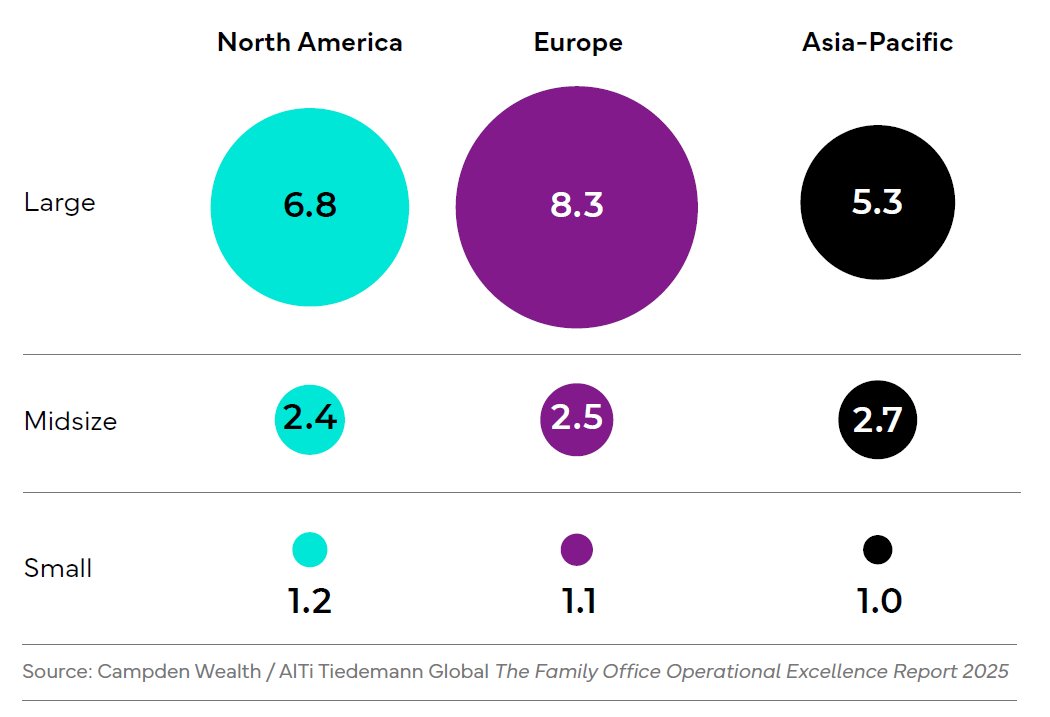Looking for a career change? The #FamilyOffice industry could be the right for you.
From investment advisors to gardeners, a 🧵 on the jobs and salaries in the Family Office world.
👩👩👧👦🧑🌾👩🍳🍼💹💱🪙💲💸🚗👨🏫👨💼💼
#familyoffice #career #job #jobsearch
From investment advisors to gardeners, a 🧵 on the jobs and salaries in the Family Office world.
👩👩👧👦🧑🌾👩🍳🍼💹💱🪙💲💸🚗👨🏫👨💼💼
#familyoffice #career #job #jobsearch

Investment Advisor/Manager: These professionals are responsible for managing the investment portfolios of the clients and ensuring their wealth grows.
Typical salary range of $80,000 to $250,000.
Typical salary range of $80,000 to $250,000.
Wealth Strategist: They help families create and implement a wealth plan that aligns with their long-term goals and values.
Typical salary range of $150,000 to $300,000.
Typical salary range of $150,000 to $300,000.
Tax Specialist: These professionals help clients with tax planning, compliance and preparation.
Typical salary range of $70,000 to $200,000.
Typical salary range of $70,000 to $200,000.
Estate Planner: They help clients with estate planning, including will preparation and asset distribution.
Typical salary of $100,000 to $250,000.
Typical salary of $100,000 to $250,000.
Philanthropy Advisor: They assist clients in identifying their charitable goals and help them to implement them.
Typical salary range of $70,000 to $200,000.
Typical salary range of $70,000 to $200,000.
Operations Manager: They are responsible for the day-to-day operations of the Family Office and ensure the smooth running of its various departments.
Typical salary of $80,000 to $200,000.
Typical salary of $80,000 to $200,000.
Compliance Officer: They ensure that the Family Office complies with all relevant regulations and laws.
Typical salary range of $70,000 to $150,000.
Typical salary range of $70,000 to $150,000.
Human Resource Manager: They are responsible for managing the HR functions of the Family Office and ensuring that employees are well taken care of.
Typical salary of $80,000 to $200,000.
Typical salary of $80,000 to $200,000.
Marketing & Communications Manager: They are responsible for promoting the brand and services of the Family Office and building relationships with clients.
Typical salary range of $70,000 to $200,000.
Typical salary range of $70,000 to $200,000.
Chef: A professional chef is responsible for preparing meals for the family, entertaining guests and ensuring that their dietary needs are met.
Typical salary range of $50,000 to $150,000.
Typical salary range of $50,000 to $150,000.
Gardener: They maintain the grounds and gardens of the property, ensuring that they are always in pristine condition.
The typical salary of $40,000 to $100,000.
The typical salary of $40,000 to $100,000.
Childcare Provider: They are responsible for the care and upbringing of the children in the family, including schooling, extracurricular activities and providing a safe and nurturing environment.
Typical salary range of $40,000 to $150,000.
Typical salary range of $40,000 to $150,000.
Personal Assistant: They provide administrative and personal support to the family, including scheduling appointments, managing emails and ensuring that their daily needs are met.
Typical salary range of $50,000 to $150,000.
Typical salary range of $50,000 to $150,000.
Housekeeper: They maintain the cleanliness and organization of the family's residence, ensuring that everything is in order.
Typical salary range of $30,000 to $70,000.
Typical salary range of $30,000 to $70,000.
Driver: They are responsible for transporting the family and guests, ensuring that they arrive at their destination safely and on time.
Typical salary of $40,000 to $100,000.
Typical salary of $40,000 to $100,000.
If you found this interesting, please like and follow for Family Office news, job postings and gossip!
@MrFamilyOffice
@MrFamilyOffice
• • •
Missing some Tweet in this thread? You can try to
force a refresh













